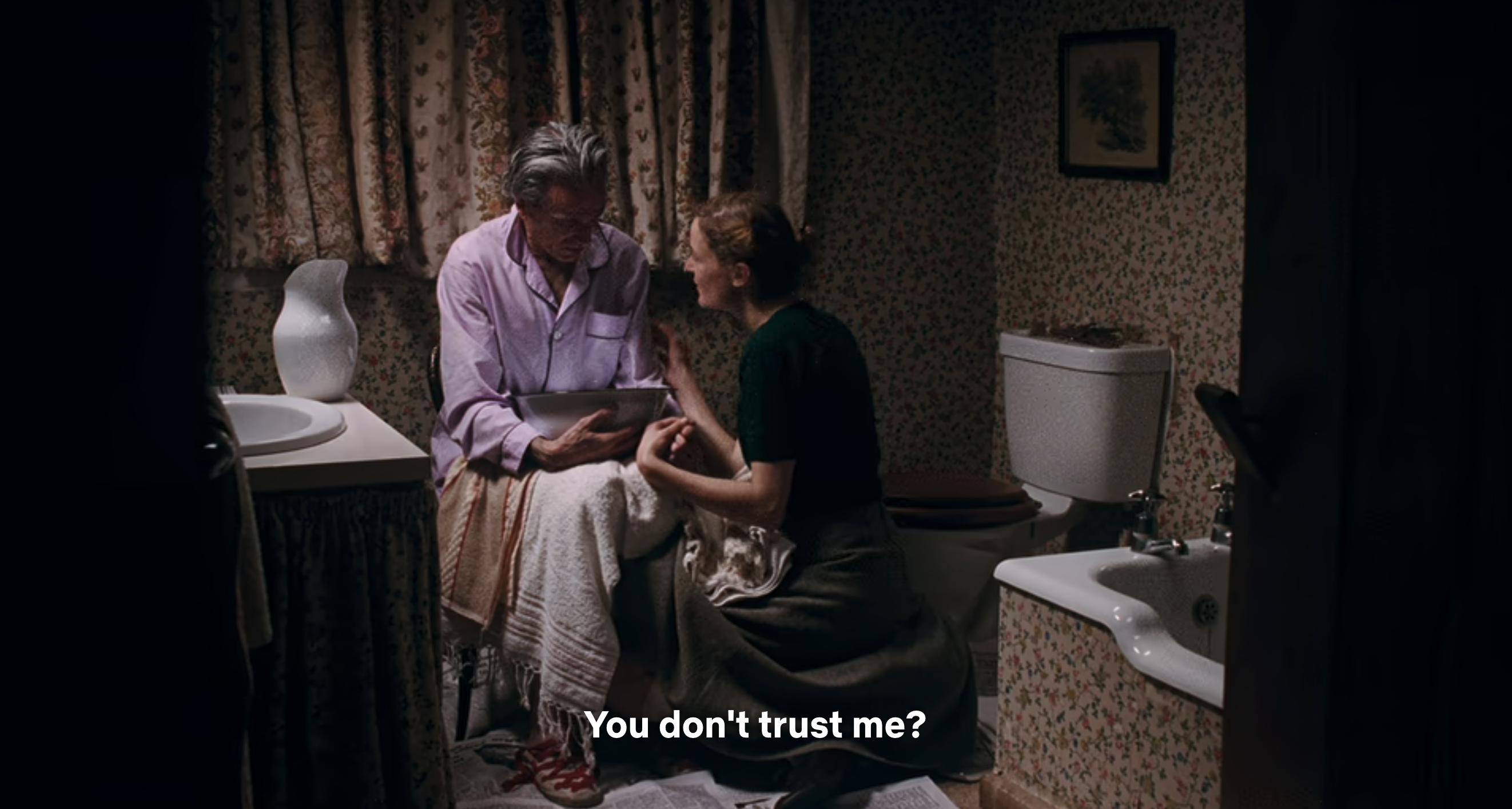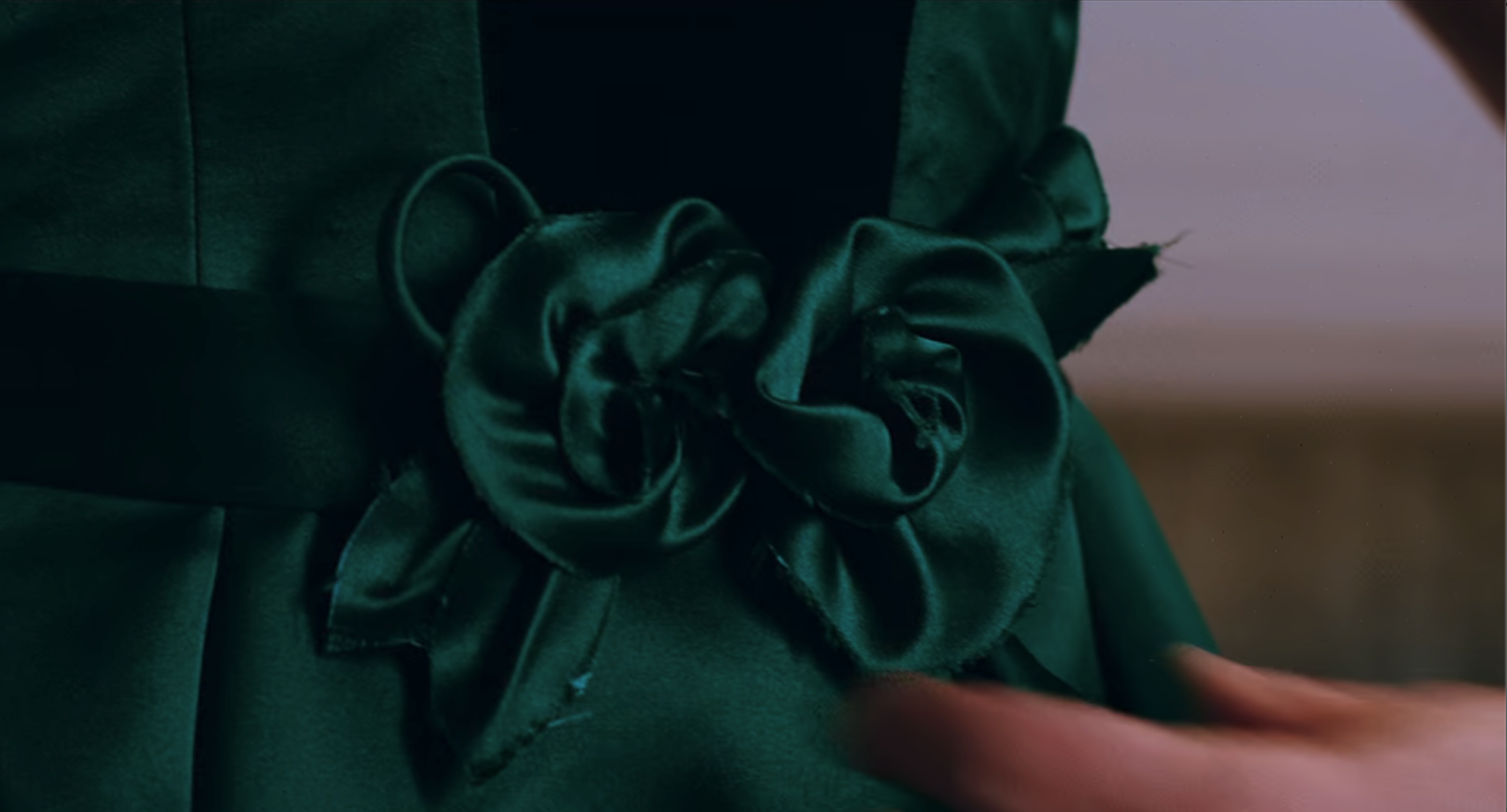PAUL THOMAS ANDERSON'S

I'm not going to dissect Phantom Thread as to how picture perfect and gorgeous and perfectly photographed and edited and scored it is from beginning to end--and how convincing are the actors, down to the pin pricks on Reynolds' thumbs, acquired through his trade as a fashion designer. To concentrate on that perfection will only get in our way and impede digging into this Pygmalion tale, except for the appreciation we will have for how it can seduce us, just as Eliza--or rather, Alma--Doolittle is seduced by Reynolds' world. When the artifice of his life chafes too much against her nature, she has no desire to leave as Reynolds suggests, to return to where he found her. She doesn't want to lose the sense of self-worth she has acquired as Reynolds' lover and model, for before he found her she didn't like herself very much. What she wants is to get control of the situation and ensure her place at the table is forever secure, that she won't be tossed aside like his former lovers. I've read a number of reviews that are just fine with the revolt of Alma Doolittle and her taking up the reins of power against Reynolds. In one such review, A. O. Scott, of The New York Times, says he doesn't know if Alma is a feminist heroine but he feels here are all the elements of a love story. He relates it's a "wrenching tale of a woman's love for a man and a man's love for his work. A dry, comic study of the asymmetries and conflicts at the heart of a marriage." It's this we need to talk about, how Phantom Thread is accepted as a love story, especially for the woman, so it's all right when pain is used as a means of control, and as Alma's sculptor is, at the end, accepted as having a hunger for pain, it's therefore all right when Alma poisons him--let's ignore that the first time she poisons him is without his knowledge, he gave no consent. That's their business, it works for them, who are we to judge how they love. Right?
At the end of the film, Eliza--or rather, Alma--gets ahead of herself with imagining futures, and into their future she brings the prospect of a child. She wheels a perambulator through a park to where she meets with her husband-Pygmalion, who she has tamed, or, who knows, perhaps her taming of him is a life-long occupation. They leave the buggy with his sister and walk away. And I promise you, this is an apt representation of what would come to pass if a child were brought into the picture. That child would get in the way too much, and eventually mother might be controlling the child as well by poisonous means. One might say, "Well, we don't know what the future would be, that doesn't matter", except it does matter because this isn't an absurdist film, the director brings a baby into the picture and has Alma walk away with Reynolds, his sister left to tend the infant. All the better, really. Reynolds' sister, Cyril, would probably do well by the child, distant but assuring care, except that Alma would likely be possessive and would never permit Cyril to take the child fully under her wing. At any rate, let's get that out of the way, Paul Thomas Anderson hauls the child in from the wings of the stage and if we have any sense at all we are thus prompted to consider how we feel about a supposed love that is about pain and control and what happens when that couple expands to be a triangle with the addition of a very powerless and dependent child. Had Anderson not added the child, I wouldn't be bringing this up.
In the myth, Pygmalion makes a sculpture of a woman and falls so profoundly in love with it that Aphrodite grants his wish that the beloved sculpture may become a living woman.
George Bernard Shaw's play, Pygmalion, concerned a professor of phonetics, Henry Higgins, who is so confident in the power of language that he bets he could pass off Eliza Doolittle, a flower girl, as a duchess if she learned how to speak properly. Eliza is eager to attempt this transformation, which turns out to involve far more than changing her speech, she has also to change her manner and be adorned in the requisite trappings. In the original play, Eliza and Higgins are not a love match, Shaw very decidedly did not want a love affair between them. Eliza's lower class status wasn't accompanied by any inherent lack of self worth; she was struggling for independence in her desire to "better" herself, to lift herself into a class in which she could ably support herself, she was the one who sought Higgins out after a brief interaction on the street, hearing him speak of how he could transform her, and had even offered to pay for the lessons. She retains this independence, which Higgins would never fully accept, and marries Freddy, a man of "genteel poverty" with whom she can form a partnership in life. It was the movie version of the play that gave the audiences the romance between teacher and pupil they thought would be the perfect ending. Shaw understood all the reasons why Higgins and Eliza would never be romantically involved, he even wrote a humorous "What Comes Afterward" on this, and struggled to keep the movie from turning Higgins and Eliza into a love story, but failed.
Phantom Thread begins as a Pygmalion story. Reynolds is a fashion designer for the upper classes. Having just finished a difficult job, he goes to relax in the countryside and meets Alma. She is a waitress who serves him at a hotel, and It seems an unlikely pairing. We've been introduced to his perfectionism yet he is immediately captivated by her though she is clearly of a lower class and behaves clumsily. She is immediately captivated by him and his attentions. He doesn't exert force. He asks her if she will do such-and-such and time after time she says, yes. We learn she has already the required foundational materials, the perfect body shape, for becoming Reynolds' new mannequin-model and muse. At the beginning of the film, with his completion of a dress, Reynolds had at the same time wearied of a former lover, and we realize that Alma is part of a pattern. Reynolds will take the raw materials of Alma and transform her. She is his next "dress" as it were. Alma knows Reynolds is around beautiful women all the time, so she wonders at his interest in her, and he makes it clear she is not to expect anything permanent as he is a confirmed bachelor who makes dresses, he is married to his work. As for Alma, though she chafes against Reynolds' rigid lifestyle, she is enthralled, and why wouldn't she be? We're given the impression she has no family any longer, or none she cares to see, she has no community she regrets having left behind, and she has no prospects. Not only is she refined by her association with Reynolds, his costuming creating for her a new persona, she acquires a sense of purpose, but not the level of respect for which she aims. She resents that she may be confused with one of Reynolds' workers.
When their relationship becomes strained, as Reynolds nears the end of the job of creating a dress for the wedding of a princess, knowledgable that she's about to be sacked, Alma decides upon the Yellow Staining Mushroom as the appropriate poison to feed Reynolds, as it will make him very ill but not kill him. Anderson allows us a glimpse of the name of the mushroom in a book Alma had consulted to see if it was poisonous. I'm looking right now at an article on the mushroom and it states that though there are a few who have no problem with the mushroom, for most it is poisonous, and causes sweating, flushing, and severe intestinal distress. Why would she poison him? Alma has already determined that Reynolds is not as strong as he would have everyone believe, certainly not when he's distanced from the support network he has built around him, whereas she boasts she has the stamina to stand forever as his dress mannequin, her ability to persevere transcends all others. And she has warned Reynolds that he would not beat her in a staring contest. Curiously, these strengths make her not unlike Pygmalion's statue, which would also be able to stand forever and outstare anyone. In response to becoming quite ill--and having hallucinated his mother appearing in his bedroom in a wedding dress he'd fashioned for her when sixteen--Reynolds confronts his mortality, which frightens him, he has much yet that he longs to do. He decides that Alma, who closed others out so that she was his sole, devoted nurse while he was sick, should be his wife. She will help him. Their marriage will lift the curse that is on the house, a superstition that Reynolds had previously denied, which is that those who sew wedding dresses are doomed to never marry.
After his marriage to Alma, Reynolds, increasingly dissatisfied, losing his confidence, exclaims he has made a terrible mistake bringing Alma into their home, that she is destroying everything. He says there is an air of quiet death in the house and he doesn't like the way it smells. Is Alma's presence destructive? The wedding gown he'd fashioned for the princess, he declared a failure, ugly, and though it had beautiful elements, it was odd in its architecture. Alma so convinces him in the moral superiority of his couture that when a client becomes publicly drunk and passes out in one of his dresses, Reynolds is emboldened to agree with Alma that the woman is not fit to wear his dress, and Alma bullies her way in to the woman's bedroom to strip the dress off her even as she sleeps. Reynolds finishes a dress for a client and she is trying it on when he becomes overcome by anxiety, and runs to complain to Cyril of the error he'd made in marrying Alma. After he leaves the room, Alma, steps forward and puts the finishing touch on the green dress, which is a green ribbon that wraps around the waist and has a green rose fashioned at the front, but we can see the green rose is unfinished, haggard in appearance, threads bristling, frayed at the edges.

Before Alma's first poisoning of Reynolds, I would have been one to defend her because Reynolds is so controlling, because we know his pattern of building women up and then tossing them aside when he has finished a project, but now I feel no empathy for Alma. And in feeling no empathy I am set up for the great unveiling.
The first time Alma doses Reynolds, it is with a small amount of ground mushroom in his tea. Earlier in the movie, when Cyril met Alma she remarked on who was this lovely creature who was making the house smell so nice, then had drawn in close to Alma in order to smell her and defined the scents. Sandlewood, rose water, sherry and lemon juice. Smell is important, because, as it turns out, the Yellow-Staining Mushroom smells unpleasantly of phenol, which is made especially strong when cooked, enough so that people may be turned away by the scent alone. Anderson affords us a glimpse of the book that identifies the mushroom, and that it is poisonous, but the fact that it can smell strongly of poison isn't included on the page, only that it is bitter. After Reynolds has declared there is a smell of death in the home, Alma decides to poison him again. Whereas Reynolds may not have noticed the phenol scent in the tea, or may not have been able to identify it if he did smell it, as Alma prepares the meal, looking first at her mushroom book, then beginning to chop the mushrooms, he watches her with curiosity and a seeming, dawning awareness. Whereas before she'd given him tea tainted with a very small amount of mushroom, now she prepares an omelette that is filled with sizable chunks of mushroom and sets it before him. Cyril, when meeting Alma, had leaned in to smell her and identify the scents on her. Reynolds picks up his plate to smell the omelette as Alma watches. And he eats. He has smelled the phenol, he knows Alma is poisoning him. As if taking on what is a dare, he puts a large chunk of the omelette in his mouth, and chews on it, staring at Alma as she stares back at him. In an unsettling interview had with a visiting doctor, perhaps during the episode of illness following, she describes Reynolds as difficult, how he gives so much to his work that after a job he needs to come down again, that during those periods he's like a spoiled baby, and becomes tender. This lasts for several days and then he's well again. Now, as Reynolds chews the mushrooms, Alma tells him her intention, she wants him flat on his back, helpless, tender, open, with only her there to help him, then she wants him strong again. "You're not going to die. You might wish you were going to die, but you're not going to.
You need to settle down a little." And he kisses her. He smiles as he kisses her.
That is what I previously called the great unveiling. If you felt no empathy for Alma as she was poisoning Reynolds, now we have the big reveal that Reynolds, having learned that Alma intentionally poisons him, is just fine with Alma punishing him with deathly pain. If Reynolds is good with it, then what complaint can the viewer have?
Then cut to Reynolds in the bathroom, on his way to becoming very ill, Alma curled up at his feet. He asks her to call the doctor just in case. "You don't trust me?" she asks. He replies that he does, but...and Alma says she will call but that she will make him well again. He tells her he loves her. She says she loves him.

Cut to the doctor seeming to be approaching the house the following morning, then Alma's interview with the doctor and her telling him, "If he didn't wake up from this, if he wasn't here tomorrow, no matter, for I know he'd be waiting for me in the afterlife, or some safe, celestial place in this life and the next and the next one after. And for whatever follows on the road from here, it would only require my patience to get to him again."
Apparently Reynolds comes out all right as the doctor comments "Very good" when checking him, and Reynolds and Alma share a knowing smile. The dramatic music, filled with great stately pathos, that has played throughout the night of the omelette, ceases. Begin a lovely, gentle, even satisfied music as the film cuts to Alma walking the baby carriage and relating her fantasy of a good life. Time has passed and she finally understands Reynolds, and takes care of his dresses, protecting them. At the end of the film, they are both relaxing before a fire as Reynolds continues to heal. He calls her back to the present, away from her meditations on the future. He says he's becoming hungry again, and Alma smiles.
Either Anderson has made the viewer feel it's all right to look upon this as a great love story, that Alma has tamed Reynolds, also giving him what he wants by punishing him with pain, then healing him, or Anderson has set it up for the viewer to examine their willingness to accept this as a love story despite the fact Alma is poisoning Reynolds, because Reynolds submits and they share protestations of love, never mind that she essentially tells the doctor she's all right if Reynolds dies, because it'll not matter to her, she knows he'll be waiting for her, she'll find him again. If a viewer has dealt with a very bad, crazy, dangerous situation in their life, if there's someone they seriously don't want to see ever again, not even in the afterlife, they're going to perk up when Alma says she'll find Reynolds again, whether it be in the afterlife or some next life.
Unfortunately, Anderson reveals in an interview with Vulture that he sees this as love, and partly came up with the idea when he was ill, brought down low in bed, and was struck with how his wife, in charge, looked upon him with tenderness. He talks of the need to slow down and how illness can make you do that. We should all just slow down and smell the roses, or some such.
Having someone take charge and behave tenderly with you when you're ill is not the same as someone poisoning you. And it would have mattered if Reynolds hadn't woken up the following day, because then it would have been an act of murder. Let Alma try to explain on the stand, during a trial, how it was love made her do it, and she's still going straight to prison.
I would so much prefer it if Anderson was intentionally luring the viewer into absolving Alma of poisoning Reynolds so that they might jerk themselves awake from this deathly love fantasy and remind themselves, no, poisoning a person isn't all right, and while Reynolds was a difficult person, even an asshole, he didn't prevent Alma from leaving, she could have walked out the door at any time, it's not an act of feminist heroism that she instead poisons Reynolds, it is instead either criminal or criminally insane. Had the roles been switched and a man was feeding a woman toxic mushrooms in order to get control over her, I don't think there would presently be any enthusiastic praise over this as a love story.
There is a piece of music in the movie that briefly recalls "I'd Do Anything" from the 1968 musical Oliver, which has as a sub-plot Nancy, an impoverished bar maid, head-over-heels in love with an abusive Bill Sykes, who roughs her up now and then, she sings "As Long as He Needs Me" she's going to stick with him, and what does he do but murder her. "I'd do anything" is performed when she is playacting, with Fagan's troop of child thieves, that she's a member of the upper class riding in a posh carriage, and they avow they would do anything for her, then promise in the same song they would do anything for Fagan, even if their thieving would mean their execution by hanging. This may be a fluke resemblance, but if it's not then we're supposed to think of Oliver. There's also a touch of Hitchcock's Vertigo that seems to swirl into the score during the honeymoon of Reynolds and Alma, and what is Vertigo about but a man who remakes a woman of a lower class in the image of an upper class phantom, unable to fall in love with the real woman as he is instead obsessed with the perfection of the ghost.
This is a film that ends on such note of self-assured purity of intent, of Alma's poisoning being not abusive but instead her way of doctoring Reynolds, that it really needs the wake-up call of the viewer fast-forwarding a year or two in the future, or maybe only several months, when things continue to deteriorate, and Reynolds either dies of mushroom poisoning or he is rescued by a doctor who has grown suspicion, and I don't know what happens to Alma but Reynolds ends up in therapy over this toxic relationship for a number of years.
Phantom Thread is a beautifully-crafted film. It's just not a love story, it's not even a story about an unconventional "love". It's a film about criminal abuse within a profoundly toxic relationship, and I'm fine with this, but the audience needs to recognize the relationship for what it is.
December 2024
Return to top of page
Link to the index page for all the analyses

